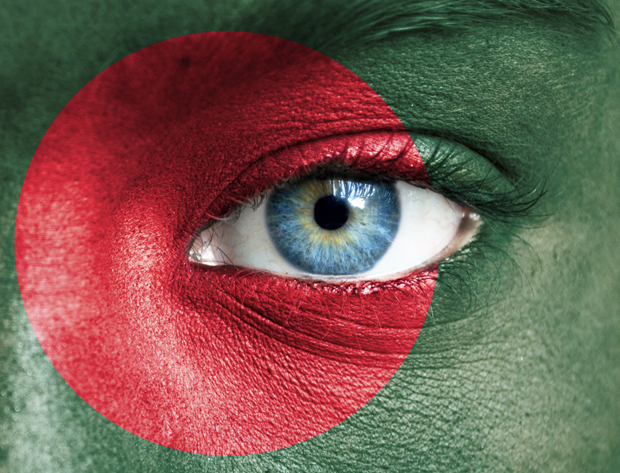Bangladesh witnessed the internet take on an increasing role in its socio-political sphere in 2013. Usage trends swung more toward heart-warming positives, in contrast to the country’s regulatory precedents, which despite policymakers facilitating net use via cheaper connections and better infrastructure, have been mostly negative. Common people felt empowered using the internet.
Last February, tens of thousands of people were gathered, inspired by blog posts and social media to protest for the first time in the country’s history. At the same time, religious zealots started attacking online activists, and policymakers initiated the use of a draconian ICT (information and communication technology) act to clamp down on opposition, thus threatening digital freedom of expression overall.
Internet usage, mobile telephony penetration, and other ICT-enabled applications have been enjoying steady growth in both Bangladesh’s private and public sectors for over a decade. The present political leadership came to power with a mandate to “digitise” the country by implementing its Digital Bangladesh by 2021 vision. This policy rolled out net enabled ICT centers to ensure easier access of information for its citizens all over Bangladesh. At present, the national teledensity is at over 70%. Around 20% of the population use the internet, of which 90% go online using mobile phone services. There are around 200,000 local bloggers based in Bangladesh, who alongside millions of Bangladeshi Facebook users were until recently enjoying near-uninhibited freedom to express their thoughts online.
The true power of social media to mobilise massive groups of people on a political issue was first observed in Bangladesh during the Shahbag movement in February 2013. Like the 2011 uprising in Egypt’s Tahrir Square, protesters gathered for several weeks in the Shahbag intersection of Dhaka University campus, demanding justice against known war criminals of its liberation war in 1971. This movement was initiated by local bloggers and social network users, and flourished with their help. People were using online media freely to organise in the real world and to create spaces for net based dialogue on critical issues. However, along with such freedom came confrontation. Shahbag made public the conflict between the ultra religious, anti-establishment elements and the moderate, mainstream and secular netizens. One pro-Shahbag blogger was killed, many other online activists were threatened with physically harm by the zealots. Suddenly an online inspired mass protest, which was enjoying complete freedom of expression in the digital space, turned out to be the root cause of a messy and prolonged offline affair.
The Shahbag movement exposed the major weaknesses of the local legal system, responsible for guaranteeing its citizens’ freedom of expression. The government turned out to be confused in their decision making process and tried to appease both sides. It first banned several ultra-religious sites. Then the law enforcement agency arrested four secular Shahbag bloggers and organisers, charging them with “harming religious sentiments”. Such actions sent out confusing signals to the general population and posed serious questions on the existence of any tangible legal safety net for online communication in Bangladesh.
In fact, the government’s performance in the digital space has been consistently disappointing between 2012 and 2013. In addition to its self-conflicting stance on Shahbag, it applied a heavy-handed approach in dealing with other web services throughout the year. YouTube was banned for months (September 2012 to May 2013) due to The Innocence of Muslims, which ignited major protests in Bangladesh. Additionally, Facebook was blocked on several occasions, from periods of a few hours to days at a stretch. Freedom House included Bangladesh for the first time in its yearly Freedom On the Net report in 2013. Based on its performance in 2012 and first half of 2013, the internet in Bangladesh was found to be partially free, enjoying a relatively better online environment in comparison with its South Asian peers, Pakistan and Sri Lanka. Nevertheless the situation is getting worse. Indiscriminate applications of the ICT Act 2006, a rise of online hate speech and related crimes have left net users in Bangladesh insecure.
In 2013, the government started using the ICT Act of 2006 more frequently, mainly to address issues related to online space and freedom of expression. This act was formulated in early 2000 and according to many legal experts, it was due to be amended to become more user-friendly and inclusive. The Bangladeshi government did amend it in August 2013, but unfortunately made it more repressive and inflexible. The newly amended act provisions a maximum 10 years in prison and fines up to £74,555 for any offensive religious, social, or political expression made online. It moreover made arrests under this act non-bailable and the police were given the power to arrest people without a warrant. Instead of strengthening the legal system to protect peoples’ right to communicate freely online, this act tightened its grip on peoples’ freedom of communication. A series of arrests took place and several court cases were filed under the act in 2013. Besides the bloggers, editors and journalists of two newspapers, two NGO officials, and several other people were arrested, some of whom are close to opposition party politics. One university teacher was sentenced to seven years in prison under the act for threatening to kill the prime minister through a Facebook status.
Overall, the present state of affair of net freedom in Bangladesh is very uncertain. There has been no independent regulatory or legal body put in place to protect the rights of the people online. Civil society needs to be more active to thwart any digital policing that compromises public freedom. As the challenges related to ICT access in Bangladesh are being solved fast, it is now high time to make sure that its citizens enjoy true freedom while using such digital infrastructure.
This article was posted on 10 April 2014 at indexoncensorship.org





